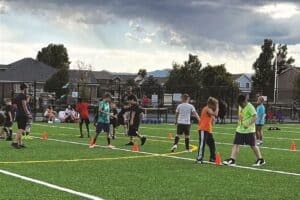Local food producers faced many challenges this year. Hail, extreme seasonal temperatures and grasshoppers have made it difficult for many small market gardens and community-supported agriculture farms in El Paso County to deliver fresh, local veggies. But water issue impacts on popular small farms topped the news.Venetucci Farm near Security suspended food sales and irrigation of crops in response to contamination in the aquifer, used to irrigate the farm’s famous pumpkins and community-supported agriculture-share vegetables. Closer to Falcon, Ahavah Farm in Peyton announced that they received a cease and desist letter from the Colorado Division of Water Resources directing them to stop using their well for irrigating vegetables and chickens for eggs.These announcements created concern among market gardeners and small farms in the area, said Yosef Camire, owner of Ahavah Farm. ìWe need more small farms in El Paso County, not fewer,î Camire said. ìOnly a small single-digit percentage of food eaten in this region is grown anywhere near here. What happens when the trucks stop, even for a little while?îWater law in Colorado is complicated. Lawmakers must balance the needs of agriculture in the state and thirsty urban areas versus what Colorado is legally required to release down river to the Midwest and desert Southwest. ìWe are a prior appropriation state, where people have very old water rights that are their private property,î said Kevin Rein, deputy state engineer for the Division of Water Resources. ìPeople rely on those rights to run their businesses and livelihoods. If someone comes along and intercepts, it’s going to impact those people downstream.îA new farmer or gardener may not realize the water they pull from a shallow well eventually would have been the water a farmer in the Arkansas Valley or in Kansas uses. The water flowing under a property may be part of larger water rights purchased generations ago. ìSomeone might do that without intending to impact someone, and they may get a long way into their plans and spend a lot of time and money, only to realize they can’t do this legally,î Rein said. ìAnd that’s not good for anyone involved.îThe relatively new beyond-organic small-scale food movement tries to keep water use as low as possible as part of an overall environmental philosophy. ìWe’re trying to do the right thing for our food supply and everyone else,î Camire said. ìWe’re trying to take into consideration the water supply, livestock and the environment.îHowever, for small-scale producers like the Camire family, Colorado law historically viewed even a single gallon of water from non-commercial wells that had been used for commercial purposes illegal.ìThere’s a few different kinds of water legally in Colorado,î said Hank Worley, Colorado Springs based water law attorney. ìIt’s all ‘H2O,’ but its treated differently by the agencies.î Most homes with wells in El Paso County will have exempt household well permits that allow either inside-the-home use with no outside watering at all or domestic well permits that allow watering of up to an acre of personal lawn or garden and personal livestock watering, Worley said.Newer micro farms and market gardeners get hung up on the phrase ìpersonal use.î The local organic food movement is relatively new in the Pikes Peak region, so the law and policies have struggled to determine where these micro farms fit into water laws. ìBefore, I haven’t done much of these small farms, but it’s becoming much more popular,î Worley said. ìI’ve been doing this for 30 years; and, before 2011, the state would have taken the position you couldn’t do anything with the water for any sales purposes.îReceiving the cease-and-desist letter from the DWR was a huge blow to Camire, especially after a series of devastating hail storms that already had stretched his farm to the limit. ìI was scared when we got the letter,î Camire said. ìWe had worked so hard to build this farm: compost, building soils, fencing, hoop houses, everything. I thought it was over, and it was a potentially life-changing moment for us. Knowing that I had done all the research to make sure we were doing it right, then getting this letter boiled my blood.îThe Camire family was able to fight the DWR’s cease-and-desist order by showing that their homestead farm met the requirements of a relatively unknown 2011 policy. The policy was in place to help rural residents commercially sell a limited amount of vegetables and livestock without violating the law and interfering with downstream rights.ìThere’s that continuum moving, from home lawn and garden through selling extras to actual irrigation of a large commercial crop,î Rein said. ìThe law describes it as a home lawn and garden. Initially, you might interpret that to mean that’s entirely for your own use. But we recognize the intent of the law is that people in rural areas will grow more and sell at a farmers market. So we articulated our interpretation to apply that people may grow products like vegetables that could be sold, but we require certain criteria is met for that irrigation.îThe DWR’s Policy 2011-3 allows the 1-acre of home gardens and lawns to include plants for sale as long as
- The property has a home that is the primary single-family residence for the party growing the plants
- The revenue from the plants sold is not a primary source of income
- The primary purpose of the irrigation is for personal use of the same kind of plants being sold
- Irrigation of plants remains within the seasons for irrigation (i.e., no heated greenhouses)







